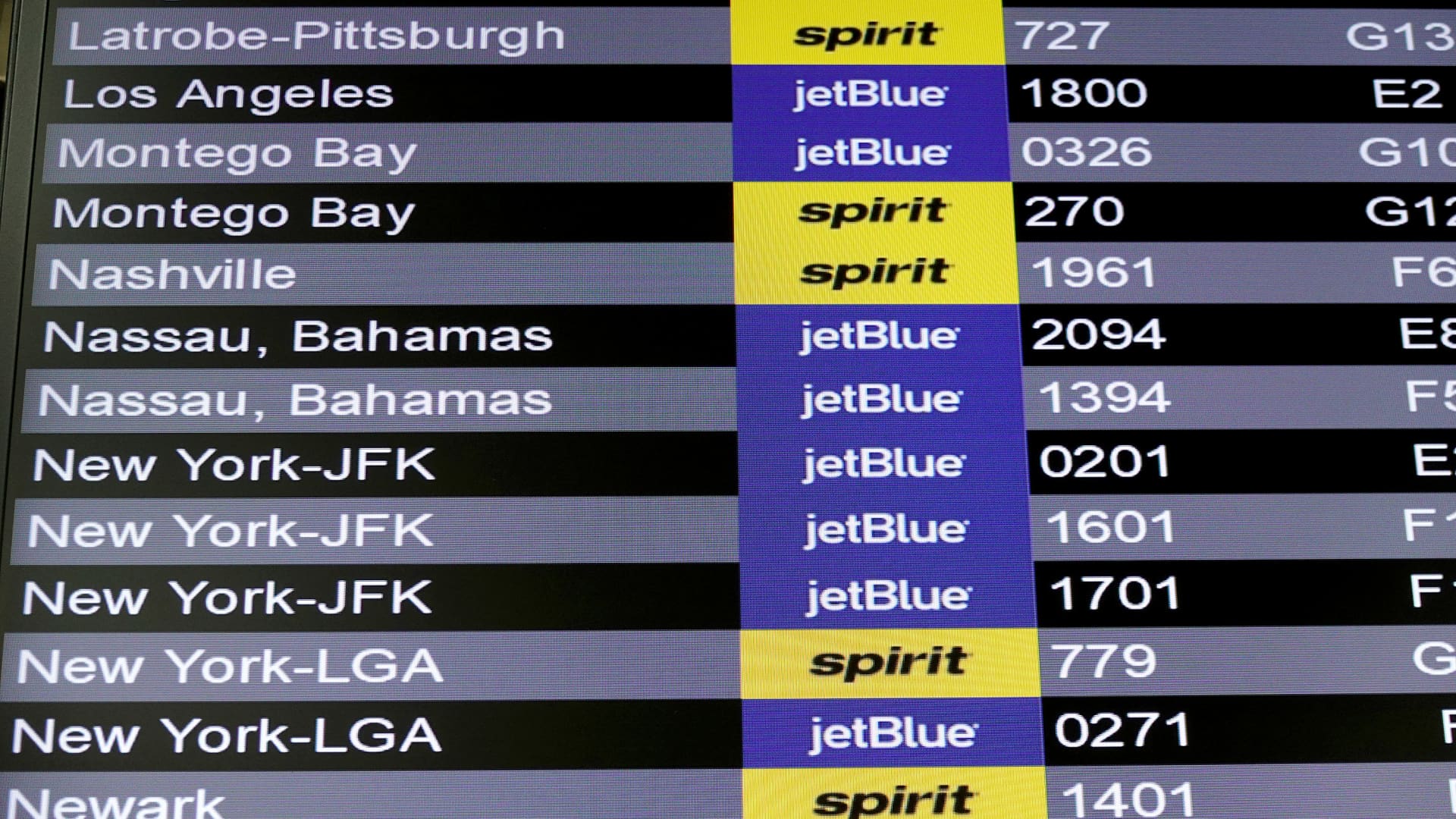Products You May Like
JetBlue Airways finally won over Spirit Airlines with a $3.8 billion takeover deal. Now it needs to win over antitrust regulators.
The New York-based airline snatched Spirit away Frontier Airlines with an all-cash offer that torpedoed the cash-and-stock deal the two discount airlines had forged earlier this year. Hours after Spirit and Frontier said they terminated their merger agreement, which lacked shareholder support, Spirit said it agreed to sell itself to JetBlue.
JetBlue said it expects to win regulatory approval in the fourth quarter of next year or the first three months of 2024. The carriers expect the deal to close in the first half of 2024.
If regulators sign off, it would mean the end Spirit, a brand that has become a punchline about the indignities of discount air travel, where passengers trade comforts like standard legroom, snacks and free cabin baggage for a cheap fare.
Will regulators allow an ultra-low-cost airline to get absorbed during the hottest stretch of inflation in decades and remodeled into JetBlue’s image, which more closely resembles large carriers?
The regulatory hurdle is high. President Joe Biden’s Justice Department has vowed to challenge out any deals that could harm competition. Last year, it sued to block JetBlue’ alliance with American Airlines in the Northeast. A trial is set to begin in late September.
JetBlue is optimistic. The DOJ lawsuit alleges American could overpower JetBlue and says the alliance, which lets American and JetBlue coordinate routes in busy airports serving New York and Boston, amounts to “a de facto merger.”
JetBlue CEO Robin Hayes said a combined Spirit and JetBlue, which would become the country’s fifth-largest airline, would create a strong competitor to the big four U.S. carriers: American, Delta, United and Southwest. After more than a decade of consolidation, those carriers control roughly three-quarters of the U.S. market.
“The best thing we can do to make the industry more competitive is to make a truly national, low-fare high-quality airline to compete on a more national scale with these legacy airlines,” Hayes said in an interview. “By merging JetBlue and Spirit together, we’re able to do that much more quickly than we would do alone.”
American declined to comment. The Justice Department didn’t immediately respond to a request for comment but the agency’s antitrust chief, Jonathan Kanter, has promised a hard stance against anti-competition.
“It is no secret that many settlements fail to preserve competition,” Kanter said in a speech in Chicago in April. “Even divestitures may not fully preserve competition across all its dimensions in dynamic market.”
The Justice Department has signed off on airline mergers, though not without some legal battles. The combination of American Airlines and US Airways in 2013, for example, was approved at the end of that year after the department sued to stop the deal.
But it is likely to require JetBlue and Spirit to divest some of their assets in the process, said John Lopatka, a law professor who specializes in antitrust law at Penn State Law.
Without that, “there would be a public perception that [the Justice Department] just caved,” he said.
Regulators will be studying fares and overlapping routes, particularly in places such as Florida where the airlines have large operations.
“I think they’re up against a lot,” Lopatka said of JetBlue and Spirit. “I think there is almost no chance they’ll be able to pull off the merger without some concessions.”
The Transportation Department, which would also need to sign off, didn’t immediately comment.
Airlines have drawn scrutiny this year from high-profile lawmakers including Sen. Bernie Sanders, I-Vt., as passengers faced an increase in flight cancellations and delays, partially driven by staffing shortfalls.
“I am closely reviewing the JetBlue-Spirit merger for its impact on consumers and workers, and I expect the Department of Justice and Department of Transportation will conduct an objective investigation as well,” Sen. Ed Markey, a Democrat representing Massachusetts, where JetBlue has a large operation, said in a statement
